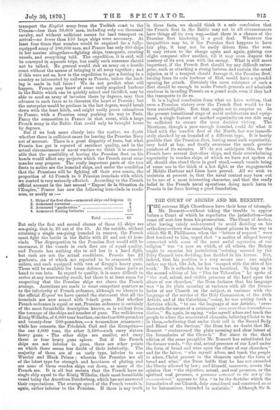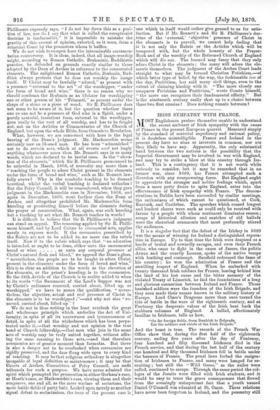THE COURT OF ARCHES AND MR. BENNETT. T HE extreme High
Churchmen have their hour of triumph. Mr. Bennett—without taking the trouble to appear before a Court of which he repudiates the jurisdiction—has come off scot-free from his prosecution. The Court of Arches, after having vainly endeavoured to avoid deciding on his orthodoxy—there was something almost piteous in the way in which Sir R. Phillimore, when the " letters of request " were first tendered to him, urged that " a matter of alleged heresy connected with some of the most awful mysteries of our religion " was "a case on which, of all others, the Bishop ought to exercise his jurisdiction "—being coerced by the Privy Council into deciding, has decided in his favour. Not, indeed, that his position is a very secure one ; one might rather say that, like Job, he has escaped with the skin of his teeth.' He is orthodox, but he was heretical. So long as in the second edition of his " Plea for Toleration " he spoke of " the real, actual, and visible presence of the Lord upon the altars of our churches," the Dean declares that his language was " in its plain meaning at variance with all the formu- laries of our Church on the subject, at variance with the language of the service of the Holy Communion, of the 28th Article, and of the Catechism,"—nay, he was setting forth a. doctrine which, " to use the language of our Articles, over- throweth the nature of a sacrament' even more than transubstan- tiation." So, again, in saying, "who myself adore and teach the people to adore the consecrated elements, believing Christ to be in them,—believing that under their veil is the Sacred Body and Blood of the Saviour," the Dean has no doubt that Mr. Bennett " contravened the plain meaning and clear intent of the formularies of the Church." But since in the third edition of the same pamphlet Mr. Bennett has substituted for the former words, " the real, actual presence of our Lord under the form of bread and wine upon the altars of our churches," and for the latter, " who myself adore, and teach the people to adore, Christ present in the elements under the form of bread and wine," the Dean holds that he has not exceeded the liberty allowed by law ; and himself, moreover, avows the opinion that "the objective, actual, and real presence, or the spiritual real presence, a presence external to the act of the communicant," appears to him " to be the doctrine which the formularies of our Church, duly considered and construed so as to be harmonious, intended to maintain." Although Sir R.
Phillimore expressly says, "I do not lay down this as a posi- tion of law, nor do I say that what is called the receptionist doctrine is inadmissible," it is impossible to mistake the gravity of this avowal of opinion, extorted, as it were, from a reluctant Court by the promoters whom it baffles.
We do not wish to re-open here the interminable sacramen- tarian controversy. It is clear, indeed, that all image-worship might, according to Roman Catholic, Brahminic, Buddhistic practice, be defended on grounds exactly similar to those adopted by the Dean of Arches in reference to the consecrated elements. The enlightened Roman Catholic, Brahmin, Bud- dhist always protests that he does not worship the image itself. If Christ may be lawfully "adored," as present with a presence " external to the act " of the worshipper, " under the form of bread and wine," there is no reason why we should condemn the Brahmin as an idolater for worshipping one or other person of his " Trimurti," as present under the shape of a stone or a piece of wood. Sir R. Phillimore does not seem to be aware of it, but the question whether there can or can not be a presence of God who is a Spirit, under a purely material, insentient form, external to the worshipper, goes really to the root of all worship, and has to be fought out, not on the Articles or Commentaries of the Church of England, but upon the whole Bible, from Genesis to Revelation.
What, however, we are concerned with here is the legal bearing of the Dean's judgment. Mr. Mackonochie seems certainly now an ill-used man. He has been "admonished " not to do certain acts, which at all events need not imply anything whatsoever more than Mr. Bennett says in so many words, which are declared to be lawful ones. Is the " eleva- tion of the elements," which Sir R. Phillimore pronounced to be unlawful in March, 1868, of necessity any more than a " teaching the people to adore Christ present in the elements under the form of bread and wine," such as Mr. Bennett law- fully avows ? Why is the symbolic teaching to be deemed heretical, whilst the verbal teaching is declared orthodox ? But the Privy Council, it will be remembered, when they gave judgment in the Mackonochie case in November, 1868, and again in December, 1869, went further than the Dean of Arches, and altogether prohibited Mr. Mackonochie from kneeling or prostrating himself before the elements during the prayer of consecration. What, again, was such kneeling but a teaching by act what Mr. Bennett teaches in words ?
It is difficult to believe that Sir R. Phillimore's judgment can stand on appeal. The reasoning applied by Sir R. Philli- more himself, and by Lord Cairns to ceremonial acts, applies surely to express words. If the ceremonies prescribed by the Rubric are not to be added to, no more can the rubric itself. Now if to the rubric which says that "no adoration is intended, or ought to be done, either unto the sacramental bread or wine or unto any corporal presence of Christ's natural flesh and blood," we append the Dean's gloss, " nevertheless, the people are to be taught to adore Christ, present in the elements under the form of bread and wine," this is as clear an addition to the words as the elevation of the elements, or the priest's kneeling, is to the ceremonies. So the 28th Article of the Church is in reality added to when to its words "the Sacrament of the Lord's Supper was not by Christ's ordinance reserved, carried about, lifted up, or worshipped," we have to annex the qualification, " never- theless, the objective, actual and real presence of Christ in the elements is to be worshipped ;"—and why not also " re- served, carried about, lifted up " ?
We do not in thus writing in the least overlook the great and wholesome principle which underlies the Act of Uni- formity, in spite of all its narrowness and tyrannousness of detail, in spite of all the wickedness which has been perpe- trated under it,—that worship and not opinion is the true bond of Church fellowship,—that men who join in the same acts of worship may be truly united together, without affix- ing the same meaning to those acts,—and that therefore ceremonies are of greater moment than formulas. But there is also a danger not to be overlooked when ceremonies are rigidly preserved, and the door flung wide open to every kind of teaching. It may be that religious orthodoxy is altogether incapable of legal definition or maintenance ; it may be' that Courts of Arches, Committees of Privy Council, are unfit tribunals for such a purpose. We have never admired the spirit which prompted the prosecution in either Gorham's case, or Heath's case, or Mackonochie's case, viewing them and their congeners, one and all, as the mere warfare of sectarians, the mere battle-fields of party hate. Looked upon merely as another signal defeat to sectarianism, the issue of the present case is
one which in itself would rather give ground to us for satis- faction. But if Mr. Bennett's and Sir R. Phillimore's doc- trine of the external," objective ' presence of Christ in the elements is to prevail, we cannot help feeling that it is not only the Rubric or the Articles which will be tampered with, but the whole honesty of the Prayer- Book and of the worship of the Reformed Church of England which will die out. The learned may fancy that they only adore Christ in the elements ; the many will adore the ele- ments themselves. The judgment of the Arches Court leads straight to what may be termed Christian Fetishism,—of which latter type of belief, by the way, the fashionable ism of the day, Positivism, has said many civil things, even to the extent of claiming kinship with it. " The more closely one compares Fetishism and Positivism," wrote Comte himself, " the more one recognizes their fundamental affinity." But is the nineteenth century really shut up to a choice between these two first cousins ? Does nothing remain between ?































 Previous page
Previous page